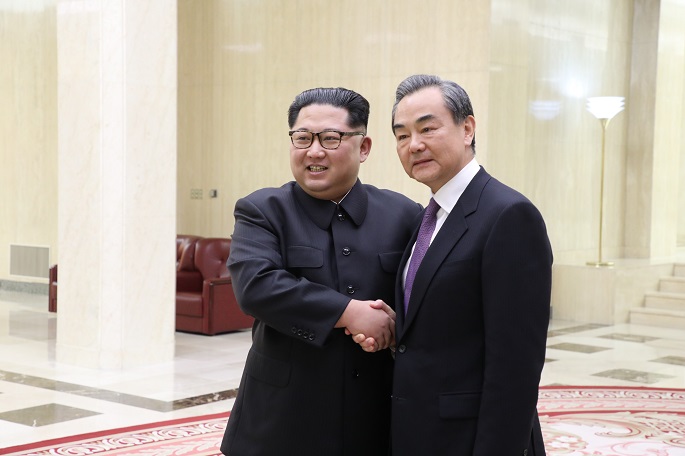DPRK top leader, Chinese FM discuss ties, issues on Korean Peninsula
Published : 03 May 2018, 18:16
China supports and congratulates on the successful completion of the inter-Korean summit last month, which has brought beneficial opportunities for a political solution to the Korean Peninsula issue, visiting Chinese State Councilor and Foreign Minister Wang Yi said on Thursday.
He made the remarks when meeting with Kim Jong Un, top leader of the Democratic People's Republic of Korea (DPRK) during his two-day visit to the country.
Kim crossed the inter-Korean border on April 27 and met with South Korean President Moon Jae-in in the demilitarized zone of Panmunjom.
On the border village, the leaders pledged to end the Korean War and reaffirmed their commitment to the complete denuclearization of the Korean Peninsula in the Panmunjom Declaration.
China supports an end to the state of war on the Peninsula, and backs the DPRK's decision to shift its strategic focus on economic development and the resolution of the DPRK's legitimate security concerns during the process of denuclearization, Wang said.
He noted that with full considerations and resolute decision on the Korean Peninsula issue, the move from the DPRK side has brought positive changes to the peninsula's condition.
China is willing to maintain communication with the DPRK over the issue and advance coordination between the two countries, he added.
Conveying Chinese President Xi Jinping's cordial greetings to Kim, Wang said that the historic meeting between Xi and Kim during Kim's visit to China in late March has opened a new chapter for the two countries' relations.
The two leaders reached a series of significant consensuses during the meeting, jointly planned and guided bilateral ties to enter a new stage of development, he said.
For his part, Kim asked Wang to transfer his greetings to President Xi and spoke highly of China's efforts and contributions to the peace and stability of the Korean Peninsula. He said that the DPRK is willing to strengthen strategic communication with China.
Kim also recalled his unofficial visit to China in late March, calling it a "historical visit." Following comprehensive and in-depth talks with President Xi, they have reached important consensus and achieved fruitful results, Kim said to Wang.
During Kim's visit, Xi said that positive changes had taken place on the Korean Peninsula since this year, and China appreciates the important efforts made by the DPRK. The Chinese leader added that China sticks to the goal of denuclearization of the peninsula, safeguarding peace and stability on the peninsula and solving problems through dialogue and consultation.
Achieving the denuclearization of the Peninsula is the firm position of the DPRK side, Kim said, adding that the DPRK is willing to restore mutual dialogue and establish mutual trust and explore the root causes of the threat to peace in the Peninsula.
It's meaningful that positive changes have appeared on the Korean Peninsula as they are helpful to solve problems peacefully, the DPRK leader said.
As for the DPRK-China ties, Kim said it is the valuable legacy left by leaders of elder generations of both countries, adding that consolidating and improving the DPRK-China friendly cooperation is a firm strategic policy of the DPRK.
The DPRK will work together with China to jointly promote the bilateral ties and friendship to a new and higher level, he added.
Wang kicked off his trip to the DPRK on Wednesday at the invitation of the DPRK Foreign Minister Ri Yong Ho. The two diplomats held discussions on the two countries' relations and the Peninsula issue.
Wang said during his meeting with Ri that the traditional China-DPRK friendship is the shared and precious treasure of the two countries, hoping this friendship will be passed to future generations.


